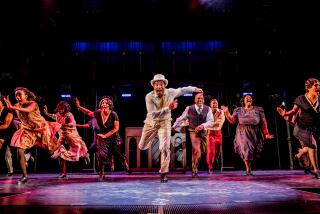STAGE REVIEW : ‘Bumpy’: A Tribute Poorly Paid
- Share via
SAN DIEGO — Bumpy Johnson led two lives: numbers racketeer and mainstay of Harlem society.
The title of the Amiri Baraka/Max Roach production about Johnson, at San Diego Repertory Theatre, notes the duality: “The Life and Life of Bumpy Johnson.” The intersections where those two lives met should be the source of considerable dramatic tension.
Forget it. Playwright Baraka is primarily interested in paying homage to Johnson, not in exploring his contradictions.
In his view, Johnson (Lance Roberts) steered Harlem gambling profits away from white gangsters and back into Harlem--and not only into his own pocket, but also into such selfless causes as the arts.
It’s an audacious new angle for Black History Month. But it remains an angle more than a play.
Most of the script dwells on Johnson’s rise from his arrival in Harlem in 1919 at age 14 into his early manhood. Through this period, we see Johnson mingling with famous figures of the Harlem renaissance--but not really contributing to their cause.
In the play’s best-drawn illustration of the way illicit profits helped support the arts, one sequence cuts between a fancy ceremony, where some artists honor their benefactor, and short scenes in the background where an enforcer roughs up some unfortunate deadbeats. Yet Johnson is the enforcer, not the benefactor, in this scene. His criminal mentor, Caspar Holstein (David Kirkwood), is the one who’s being honored for his support of the arts.
Through much of the play, Johnson doesn’t seem to be much more than just another thug. However, Baraka carefully sanitizes Johnson’s thuggery so that he stops short of actual killing. The violence in this play is sheer make-believe; we never feel anyone’s pain. Gambling is depicted as a virtually victimless crime.
Baraka completely loses sight of Johnson at times; he is absent from whole scenes and strictly on the sidelines of others. The battles between various white mobsters take far too much stage time away from Baraka’s central concerns.
By the time Johnson finally has the power to rule the Harlem roost, the play is almost over. In Johnson’s later years, we see him urging a young woman on to medical school, providing bodyguards for Paul Robeson, providing campaign money for Adam Clayton Powell Jr. and counseling a young militant (a surrogate for the young Baraka). Yet the view of this period is extremely sketchy; Robeson is yanked into the play in the most awkward way imaginable.
While most of the characterizations of the famous don’t extend far beyond name-dropping, we do see Johnson courting Ethel Waters (Carol Maillard) and finally being rejected by her. And when Langston Hughes (Damon Bryant) performs his “The Weary Blues,” it’s the most sharply focused moment of Max Roach’s score.
Generally Roach’s contributions stay in the background. In one scene, supposedly a tense confrontation between gangsters, the background music is so mellow that it competes with the action instead of supporting it.
The onstage band’s biggest moment occurs during intermission, when Baraka’s text is no longer a distraction. If you can resist the temptation to leave the theater then, the band sounds swell.
There are a few conventional musical comedy-style numbers, but the music for some of these isn’t Roach’s. The first-act finale is a breezy rendition of “Taking a Chance on Love,” in which Johnson, Waters, Hughes and Zora Neale Hurston zip through the carefree Harlem streets in a cute little golf cart made up to look like a snazzy roadster, and Johnson and Waters also sing “I Can’t Give You Anything but Love, Baby.”
Nice songs, but what are they doing in this play? Their writers aren’t credited on the “Additional Music” list in the program. There are several strong singing voices in the cast; that of Roberts, as Johnson, isn’t one of them.
Roberts skillfully depicts the aging of Johnson--until middle age, that is--and he looks elegant in Sally J. Lesser’s swanky clothes. But he suffers from the overwriting of his more opaque speeches and the underwriting of his character in general.
George Ferencz’s direction was halting on opening night, as if more rehearsals might have helped. The amount of baggage that must be carted on and off an otherwise bare stage, designed by Bill Stabile, doesn’t help. Ashley York Kennedy’s lighting scheme works overtime to suggest mystery, but the smoke effects become repetitive.
More to Read
The biggest entertainment stories
Get our big stories about Hollywood, film, television, music, arts, culture and more right in your inbox as soon as they publish.
You may occasionally receive promotional content from the Los Angeles Times.










